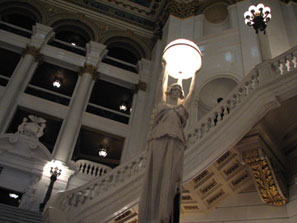
German statesman Otto von Bismarck is often credited with saying that laws are like sausages—best not to watch them being made. In Pennsylvania, the practice of municipalities issuing debt has turned out to be a similarly unappetizing process, one that has already brought down the state capital, Harrisburg. Now, Keystone State lawmakers are looking to keep more local governments from getting slaughtered. Other states should take notice.
In September, a Pennsylvania judge allowed 485 criminal charges—mostly related to municipal-finance transactions—against former Harrisburg mayor Stephen Reed to proceed to a jury trial. The most serious charge leveled against Reed in the state attorney general’s July indictment was that he had engaged in a “pattern of racketeering” to gain control of the Harrisburg Authority, an independent government agency with borrowing power. Reed and associates subsequently used the authority, over which voters have little control, to “raise money for purposes utterly unrelated” to projects they were officially touting—that is, they diverted the funds to Reed’s pet projects. The state also alleges that Reed turned the authority into a public-finance bank that raised money for various Pennsylvania governments—and then charged them “outrageous fees.” Without any oversight, Reed used the authority to back speculative municipal schemes, including a massive and risky retrofit of a local incinerator that consultants told him wasn’t financially viable. Reed subsequently fired the doubters and borrowed tens of millions for the project. Its failure led Harrisburg to default on its debt and file for bankruptcy (a judge ultimately rejected the city’s filing when the state intervened and offered a bailout plan).
Finally, a reason to check your email.
Sign up for our free newsletter today.
The scope of the indictment spans 20 years, starting all the way back in 1990. It even reaches into the years after Reed left office, as he still owned valuable museum pieces bought with borrowed city money. Moreover, Reed’s financial schemes saddled a number of local governments, including the Harrisburg School District and Dauphin County, with debt. According to state law, the Pennsylvania Department of Community and Economic Development has veto power over local debt, but it apparently had no idea that Reed was diverting funds, and it accepted his contention that his projects could be self-financing. Instead, Reed exposed taxpayers to hundreds of millions of dollars in bad debt.
Harrisburg represents only the most recent municipal-finance meltdown in Pennsylvania. After Governor Ed Rendell signed a law in 2003 giving municipalities and agencies the right to purchase swaps—contracts that involve bets on the movement of interest rates—more than 100 Pennsylvania school districts and dozens of other local governments bought the complicated investment vehicles. When interest rates plummeted in response to the national economic woes that began in late 2007, the municipalities found themselves on the wrong end of tens of millions of dollars in lousy bets. One risky swap, for instance, cost the Bethlehem School District more than $10 million to unwind, while the Port Authority of Allegheny County, which handles mass transit in the greater Pittsburgh area, had to shell out $39.2 million to get out of a similar bad deal. Many of the officials who approved the swaps failed to understand the risks involved.
Pennsylvania lawmakers are trying to head off future meltdowns. They’ve proposed prohibiting municipal governments from using swaps and adding verification procedures to applications by local governments to float debt, in order to ensure that they can repay it. Reform measures would also prevent governments and financing authorities from raising funds for one purpose and diverting them to another and would give the state’s ethics commission the right to investigate potential conflicts of interest between politicians and bankers. Given recent history, these reforms might seem an easy sell in Pennsylvania’s legislature. But municipal officials have muscle in Harrisburg, as they do in most state capitals, and they’ve pushed back against any changes. Pennsylvania’s state auditor first proposed banning swaps in 2009, but a bill has yet to become law. And reforms laid out in the wake of Harrisburg’s woes have circulated around the legislature for at least two years without gaining traction.
Pennsylvania is no exception. Independent public-financing mechanisms like the Harrisburg Authority are common, and officials often rely on them to borrow money for projects of dubious value—including sports stadiums, convention centers, and museums—without a public vote. Like Harrisburg’s minor-league stadium and Civil War Museum, these projects often hold little economic value. (In a bracing show of common sense, current Harrisburg mayor Eric Papenfuse wants to close the money-losing museum and auction off its artifacts to help pay the city’s debt.) In a 2003 article, Columbia University Law School professor Richard Briffault estimated that up to three-quarters of all municipal debt is floated via financing loopholes, so as to circumvent debt limitations in state constitutions. Detroit, for instance, turned to a type of financing mechanism known as a public-servicing corporation to borrow past its debt limit in 2005. City officials doubled down by backing the debt with complicated swaps contracts that exploded when interest rates sank in 2008. The borrowing and the swaps both contributed to the city’s 2013 bankruptcy filing.
More states like Pennsylvania could propose municipal debt reform. And if lawmakers balk, citizens might consider taking matters into their own hands. When New Jersey governor Jim McGreevey used borrowed money to close a 2004 budget deficit, reformers sponsored a ballot referendum to prevent him from doing so in the future. Passing easily with 58 percent of the vote, the measure reversed decades of court rulings that enabled officials to borrow without citizen approval.
A Pennsylvania newspaper once described Reed as a mayor who “never met a bond deal he didn’t like.” Give a politician the chance to pile up debt on favored projects without answering directly to voters, and no one should be surprised if he takes advantage of it. That’s why the history of state and local finance is filled with reform moments.




